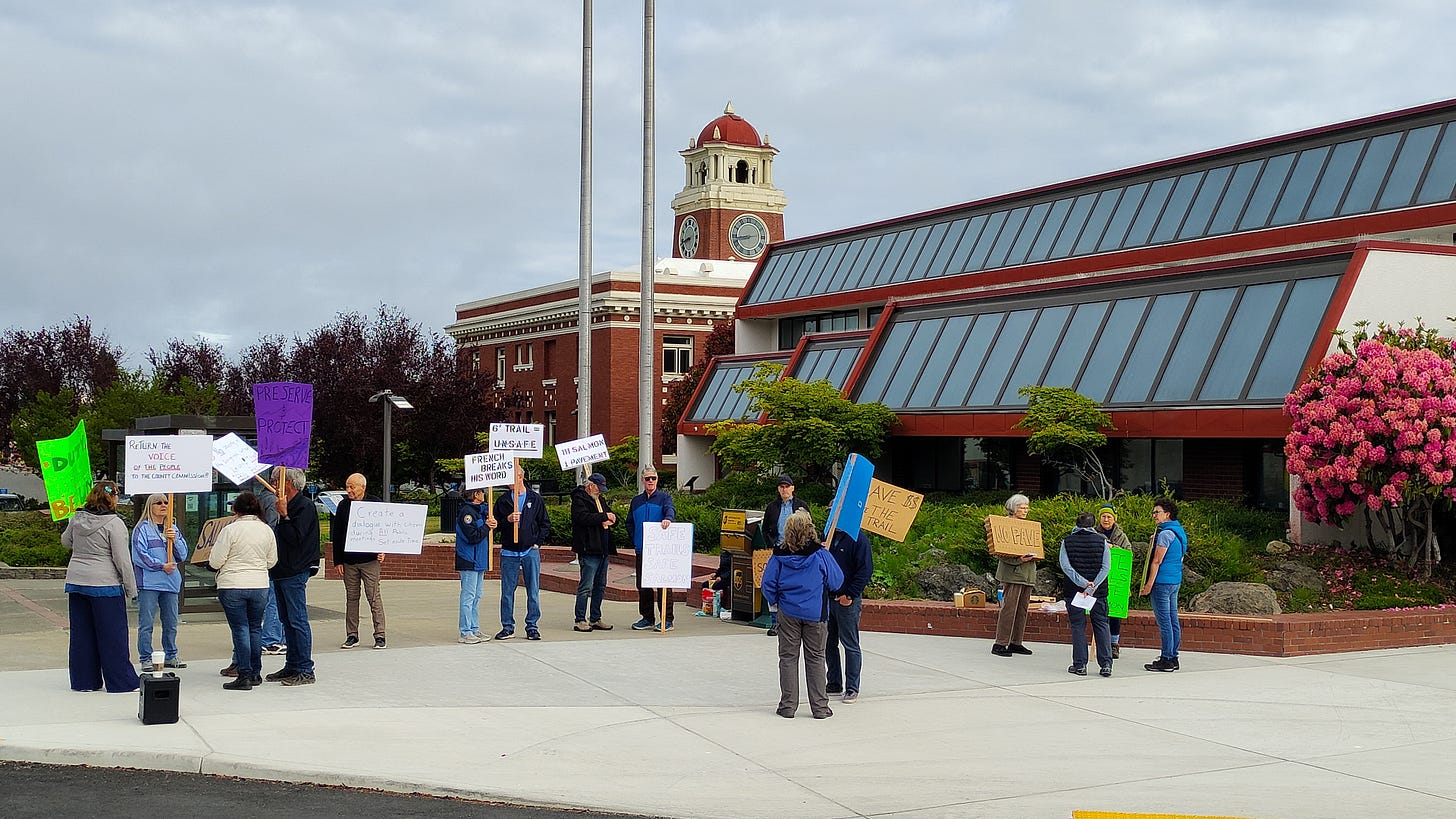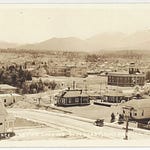This week’s roundup reveals a common theme: decision-makers are cutting backroom deals, shifting burdens onto residents, and calling it “progress.” From our supposedly “local” bank quietly selling off its buildings to Wall Street, to bond consultants scripting the outcome before Sequim voters even got a say, to commissioners breaking promises in the Towne Road fiasco, the pattern is clear. The public is told to conserve water, trust the process, and pay higher fees—while special interests cash in.
First Fed’s new boss, old problems
First Northwest Bancorp, parent company of First Federal, just named Curt Queyrouze (he/him) as its new CEO. He comes with a $550,000 base salary, a signing bonus, and stock awards—on top of golden parachute benefits. All this as the bank is still untangling from lawsuits tied to Water Station Management, a Ponzi-scheme operator it bankrolled, and from a settlement costing up to $5.7 million.
And about those “local” branches? They’re not so local anymore. In 2024, First Fed sold many of its Clallam and Jefferson County properties to an Atlanta firm, which flipped them to Fortress Investment Group, a New York firm owned by Japan’s SoftBank. The bank now leases its own buildings back at $1 million a year.
So while the branding still says “Proudly PNW,” the money trail runs through Wall Street and Tokyo. Locals get the marketing. Outsiders get the rent checks.
Who runs public health — you or the Tribe?
The Washington State Board of Health just filed a proposal that could permanently change who sits on county boards of health. Under a new law, tribes and urban Indian organizations could now appoint their own representatives directly, replacing the American Indian Health Commission’s role.
What does this mean for Clallam? Potentially more tribal influence over county health policy. That could translate to more emphasis on harm reduction, more referrals to Jamestown’s $719-per-visit MAT clinic, and more control by a sovereign nation that does not answer to county taxpayers.
Supporters call this sovereignty. Critics might call it outsourcing accountability.
Jamestown: Government or political machine?
Sequim City Councilwoman Vicki Lowe says her Tribe should be treated like a government and exempt from property taxes. Jamestown CEO Ron Allen once argued the Tribe was a “different kind of public entity” when lobbying for ownership of the John Wayne Marina.
But if Jamestown is “our” government, why are they hosting fundraisers for the 24th Legislative Democrats?
If they represent all of us, why back only one party? Maybe it’s because Olympia has already funneled tens of millions in state tax dollars to Jamestown projects, from behavioral health clinics to infrastructure.
Olympic Medical Center is on the brink of collapse. Imagine if our legislators directed public dollars toward essential health care for everyone—rather than funneling appropriations into behavioral health projects controlled by sovereign nations.
Marolee Smith Dvorak: Rethinking growth in Port Angeles
Port Angeles City Council candidate Marolee Smith Dvorak is calling for a different kind of economic growth—one built on local businesses, not government expansion. In her September 8 post Stimulate the Local Economy, she outlined a plan to:
Cut barriers for mom-and-pop businesses
Train locals for skilled jobs
Use new business license revenue to support entrepreneurs instead of bloating city staff
Actively promote local vendors instead of out-of-area contractors
Her bottom line is simple: stop growing government, start growing businesses. For more of her work, readers can follow her on Substack.
Mayor Dexter’s double standard
Port Angeles Mayor Kate Dexter recently debated Dvorak and gave some curious answers.
She said the city “should not be run as a for-profit business.” So, should it be run as a permanent social services agency?
She promised to create conditions for businesses to prosper. Yet under her watch, crime, vandalism, and trash have been the “conditions” most businesses deal with.
She voted in favor of current housing policies. Does she mean luxury apartments for the homeless, like those being built by Peninsula Behavioral Health?
She dismissed the council’s role in administration, saying their job is just to legislate. Really? By shrugging off responsibility as “just legislation,” Dexter reduces the council’s role to paper-pushing while ignoring the real-world impacts of decisions around addiction, harm reduction, and housing policies.
While the mayor expresses support for business, much of the data she highlights focuses on homelessness and addiction.
Sequim School bond: Planning or persuasion?
The Sequim School District recently announced that it hired The Wenaha Group for $5.3 million to serve as the construction management firm for the voter-approved $146 million bond project. Wenaha’s real role has been something closer to a campaign manager — their contract included pre-bond messaging, survey design, and voter targeting—while also recommending millions in construction.
Meeting notes reveal talk of how to “sell the bond” before the public even knew it was coming. The Jamestown Tribe was brought in early for consultation and donations, even though trust lands don’t pay property taxes to support schools. Consultants like Strategies360, known for progressive political work, were looped in to shape the pitch.
It’s the oldest trick in the book: hire the tailor, and they’ll tell you that you need a new suit. The question is whether taxpayers are being informed—or managed.
Port Angeles: Water shortage meets river restoration
Port Angeles just moved to Stage 3 water restrictions. Residents are prohibited from engaging in several outdoor watering activities due to low Elwha River flows.
The irony? This is the same river once harnessed by dams that supplied the city’s water and power. The dams were removed in 2011–2014 to restore salmon runs and tribal lands. The Lower Elwha Tribe’s canoe journey this summer celebrated: “Dams removed, a river reborn, spirits renewed.”
But for city residents, that “reborn” river now means restrictions, shortages, and uncertainty.
A $5 fee, or a workaround of the people?
Charter Review Commissioners rejected creating a new Water Steward office earlier this year. But county commissioners have now backed a $5 parcel fee to fund the Clallam Conservation District—nearly $200,000 in annual new revenue to grow CCD programming.
Supporters say the CCD “protects water quality.” But where’s the proof? After 66 years, they still can’t show measurable data. The push for a new water bureaucracy started years ago with League of Women Voters activists like Ann Soule, who framed newcomers as less knowledgeable about Sequim’s water—just watch the first few minutes of this video.
Residents said no to a new office. Commissioners found another way to take the money anyway.
Towne Road protest: Broken promises and the “50 People” rule
In May of last year, protesters gathered outside the courthouse with signs reading ‘French Lied’ and ‘French Breaks His Word.’ Why? Six months earlier, the commissioners had passed a resolution to complete Towne Road by fall. Yet, at an anti-Towne Road rally, Commissioner Mike French told activists that if 50 people attended a board meeting, he might reconsider his position. When he wavered again, the protesters returned, calling him a liar.
In an email, French admitted that he had indeed floated “50 people” as the threshold to motivate commissioners to reconsider. Translation: policy by headcount, not principle.

Two precedents have now been set:
It only took 98 petition signatures to stop the completion of Towne Road.
It only takes 50 people in a meeting to flip Mike French.
Rejecting the Clallam Conservation District’s $5 parcel fee should be easy if the commissioners uphold their oath to serve faithfully and impartially.
Petition drive: Citizens push back on the $5 fee
District 3 resident Jake Seegers is spearheading a petition drive to stop commissioners from imposing the $5 fee on every Clallam County property owner.
Drive-Thru Signing Event: Saturday, Sept. 20, 10 a.m. to 4 p.m., 1052 Jamestown Road, Sequim. Bring your family, sign the petition, and meet Jake and CC Watchdog.
Mail Your Petition: Download the 15-line form, gather signatures, and mail to:
Jake Seegers, 69 S. Point Rd, Port Angeles, WA 98363.
Postmark by Sept. 18 so petitions reach commissioners before their Sept. 23 meeting.
Two clear options, one message: citizens—not commissioners—should decide if new taxes get imposed.





















